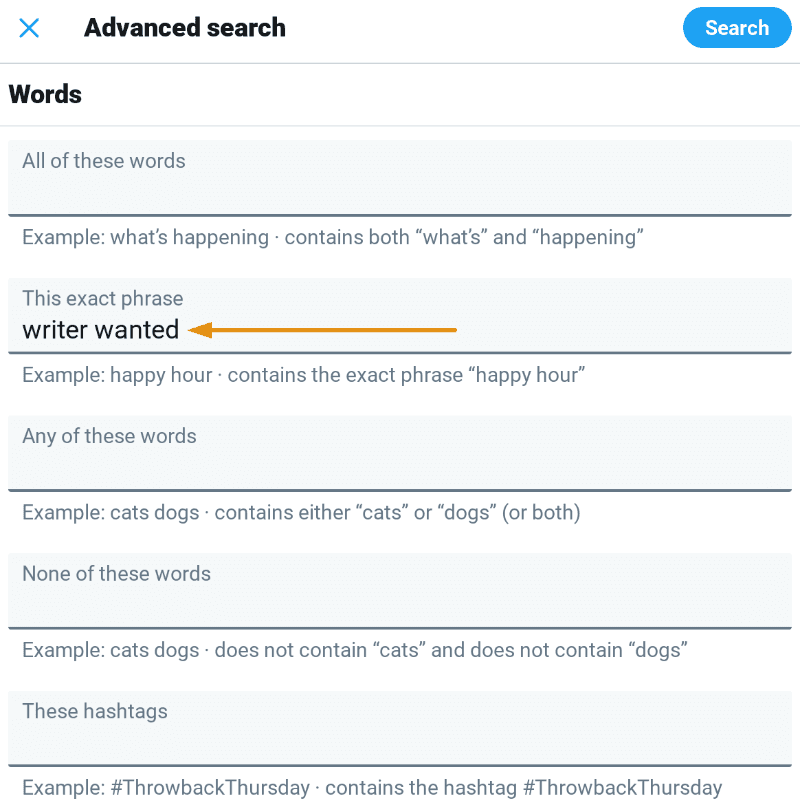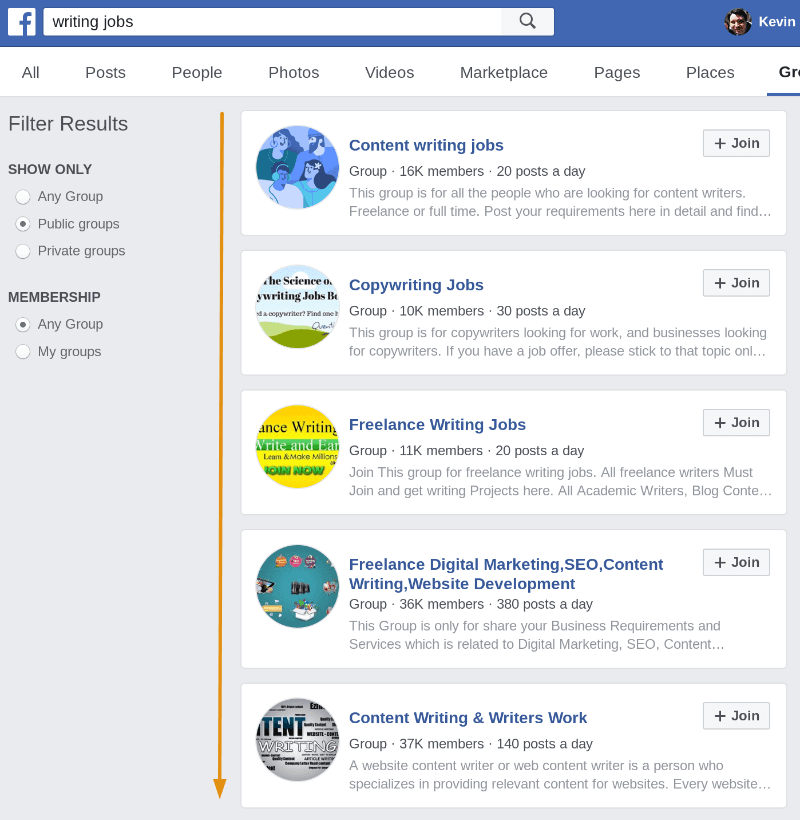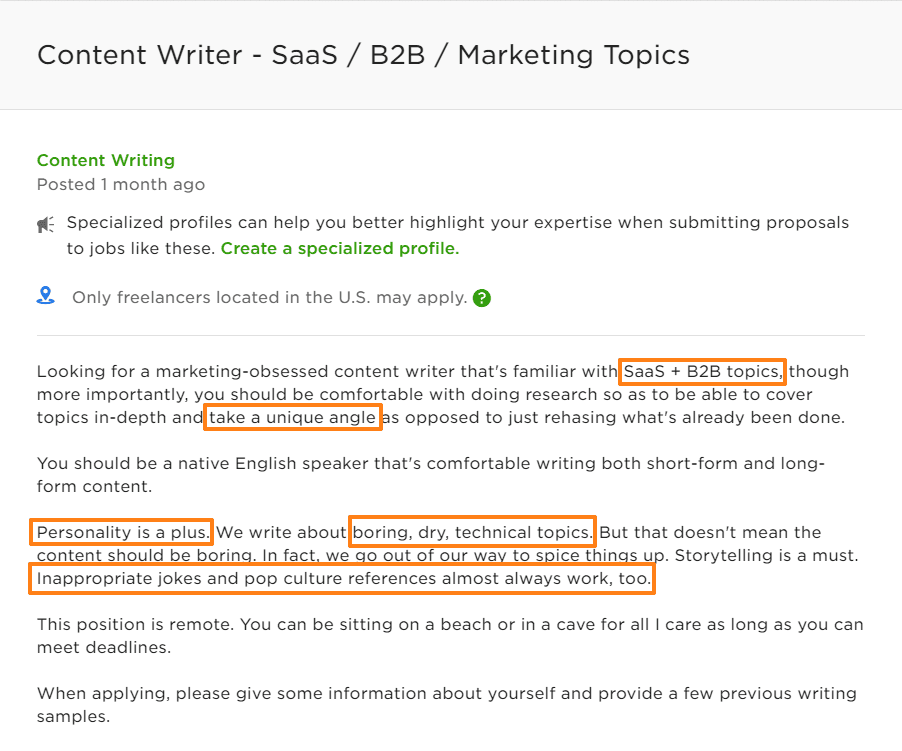Table of Contents
- 0.1 1. Use Twitter to Reverse-Engineer Online Writing Jobs
- 0.2 2. Follow Leads on Social Media
- 0.3 3. Check Out Agency Job Postings Freelance Writing Jobs
- 0.4 4. Find (and Woo) Clients on Their Turf
- 0.5 5. Pitch to Software Company Blogs
- 0.6 6. Don’t Be Scared of Ghostwriting
- 0.7 7. Find Clients Who are Already Hiring Successful Freelance Writers in Your Niche
- 0.8 8. Apprentice With a Successful Writer in Your Niche
- 0.9 9. Reverse-Engineer Writing Samples From Job Ads
- 0.10 10. Pitch Every Service You’ve Used in the Last Year Freelance Writing Jobs
- 0.11 Is freelance writing legit?
- 1 Ready to Become a Successful Freelance Writer?
Here are 10 Hacks for Finding New Writing Opportunities

Anyone can find a job board and search for a Freelance Writing Jobs .
But that’s both a good and bad thing — anyone can do it.
That awesome writing job you found online? The one you’d be perfect for? Fifty other “perfect” people found it too.
We’ll go over some great job board options in a moment (because they do have lots to offer new freelance writers), but first, we’ll take a trip down the road less traveled.
By knowing how to identify hidden opportunities many of your fellow freelancers don’t know about (or do know about, but are too lazy to pursue), you can find writing jobs from well-paying clients who fly under the radar.
For example, did you know you could…
1. Use Twitter to Reverse-Engineer Online Writing Jobs
Want an outside-the-box way to find writing job opportunities?
Try Twitter’s advanced search engine.
In the example below, I searched for tweets that included the phrase “writer wanted”:

I kept the search simple, but I could’ve also searched by language (native English, Spanish, etc.), hashtags, date range, and more. The more options you choose, the more refined your search results.
Click “Search” and you’ll see a list of tweets with various job postings for writers:

Scroll through the list and tweak your job search, as needed.
Some of the results will be scams, but most will be legitimate. Many will be for remote writing jobs, but some will be location-specific (usually New York, Los Angeles, Seattle, San Francisco, Miami, Washington D.C., Dallas, Saint Paul, Minneapolis, Portland, Oklahoma City, Greenville, Atlanta, and other major cities in the United States). Just skip over the ones that don’t apply to you.
If you look at “Top” tweets, as shown in the screenshot above, you’ll find brand-new freelance jobs mixed with older ones. Click “Latest” if you want to see recent tweets first.
The nice thing about Twitter’s advanced search feature is it’s only limited by your imagination.
Want to find guest blogging opportunities (since many websites these days pay for guest posts)? Enter “guest post” into the “this exact phrase” option and you’ll see every tweet written by someone looking to promote their latest guest blogging masterpiece.
That’ll give you a list of websites that accept guest posts, which you can later whittle down (after you’ve done a little more research) into a list of sites that pay guest writers.
Wash, rinse, and repeat.
2. Follow Leads on Social Media
When you use Twitter’s advanced search feature for finding freelance writing jobs online, you’ll discover certain Twitter handles pop up fairly frequently.
One example is @write_jobs:

When you find a good lead, follow them. That way you can cut through the noise of Twitter and go straight to your best sources.
Even better?
Add them to a private Twitter list so that tweets from all your leads can be found in one handy repository.
Here’s how you do it:

Here are a few more handles to get your Twitter list started:
- @FreelanceWJ
- @WhoPaysWriters
- @jjobs_tweets
3. Check Out Agency Job Postings Freelance Writing Jobs
Everyone likes to talk about job boards (which, again, we’ll discuss in a moment). But you know what resource most freelance writers ignore?
Agencies.
Per Jon:
How to Become a Freelance Writer, Starting from Scratch
So how can you get work from agencies? Well, you could contact them directly and ask if they have any freelance work (Jon calls this a “gutsy but effective approach”).
The other way is to keep checking their “career” page:

The Content Marketing Institute maintains a detailed database of agencies. Click here to check it out.
4. Find (and Woo) Clients on Their Turf
Most articles that tout social media as a good place to find leads will point you to Facebook Groups.
And it makes sense. After all, search Facebook for “writing jobs”, click the “Groups” tab, and you’ll see dozens and dozens of options that are open to the public:

If you’re looking for a safe space where like-minded individuals offer tips, advice, and writing inspiration; such groups are great.
But if you’re looking to find paying gigs, you’ll likely be left wanting.
Most members of these groups are looking to be hired, not looking to hire writers. And when someone wanting to hire a writer does come along, the person who raises their hand first is usually the one who gets the job.
That’s not to say Facebook Groups can’t lead to writing jobs that pay. The trick is you need to find groups where the buyers, not the sellers, hang out.
Think “masterminds”, “think tanks”, etc.
Of course, that’s easier said than done. Such groups are usually private. So, what’s a writer to do?
Skip the Facebook Groups. Go Straight to the Sources.
One of the amazing things about technology is the way it allows us to connect and interact with people with whom we’d otherwise never have the opportunity.
In 2014, I didn’t know Adam Connell of Blogging Wizard. But I joined his mailing list and, lo and behold, a “welcome” email with his address arrived in my inbox. I responded, he wrote me back, and a friendship was born.
After reading one of her posts and admiring her writing style, I connected with Henneke Duistermaat of Enchanting Marketing through a humble blog comment. The same was true with Syed Balkhi. I connected with Pamela Wilson via Twitter. For Jon Morrow, the man who would one day hire me at Smart Blogger, I got on his radar by becoming a student in one of his online courses.
Want to write for a mover and shaker in your industry? Want to befriend an influencer who can open doors for you (the kind of doors that lead to paying jobs)?
Make a connection. Be generous. Give without asking or expecting anything in return.
That means following them on Twitter, sharing their content, and interacting with them. It means subscribing to their email list.
And, yes, it may mean buying one of their products. Because here’s the thing:
When you’re their student, an influencer is invested in your future. Your success is their success. You’re a walking, talking testimonial. So many — not all, but many — will do everything they can to help you succeed.
And that includes pointing leads in your direction.
5. Pitch to Software Company Blogs
More from Jon:
e-Commerce companies with blogs tend to publish a lot of content. After all, every article they publish tends to pay for itself (and then some) thanks to the traffic it brings to the website — traffic that often leads to sales of their product.
As with agencies, you can either cold pitch the software companies (which sometimes works), or you can keep an eye out for open freelance positions:

6. Don’t Be Scared of Ghostwriting
A lot of writers don’t like the idea of ghostwriting.
I get it. You’re letting someone else put their name on and take credit for your hard work.
Yes, that’s ghostwriting in a nutshell (minus the theatrics). But here’s the thing:
- Ghostwriting pays better than regular freelance writing. When you ghostwrite, it’s not unheard of to increase your fee by 15%-20% (or more).
- The opportunities in ghostwriting are virtually endless. You could ghostwrite blog posts, articles, scripts used on YouTube channels, or even books sold on Amazon.
- You can make great freelance writing business relationships by ghostwriting. People who pay for ghostwriters tend to have money (and connections). Oftentimes, these clients can refer you to others.
If your primary goal is to build up a strong list of writing samples, ghostwriting isn’t for you.
But if your goal is to make money writing and build potentially profitable business relationships, it’s something to consider.
And here’s the best part:
Because so many freelance writers loathe ghostwriting, there isn’t as much competition.
7. Find Clients Who are Already Hiring Successful Freelance Writers in Your Niche
Want to write for great clients in your niche who pay top dollar?
Well, you can either wait until they post job ads, then compete against everyone else who applies…
Or you can take initiative and proactively seek out these ideal clients.
One of the best places to find ideal clients is in the portfolios of successful freelance writers in your niche.
By studying other writers’ sample content, you can identify clients they’ve worked with in the past.
These clients are ideal targets because:
- You already know they hire freelance writers;
- You know they have years of experience working with freelancers, so they’ll be easier to work with;
- And you know they pay decent wages, otherwise the successful freelance writer wouldn’t work with them.
Start by finding freelance writers in your niche. You can find them by Googling “[YOUR NICHE] + freelance writer” like so:

Scroll through the search results until you see a freelance writer’s website. These writing sites don’t always rank highly, so you may have to go through several pages of search results to find them.
Click on a writer’s website and check out their portfolio. There you’ll find links to articles the freelance writer wrote for various companies in your niche.
Click on a writing sample and visit the client’s website to make sure you’d be interested in writing for them. If everything looks good, add them to your list of potential targets.
Do this over and over again for every freelance writer you find in your search. When you’re done, you should have a big list of ideal clients to target.
Pick one client to target and visit their website.
Study their content to get an idea of what they publish. Pay close attention to their most popular content, as well as the article the freelance writer wrote for them. These will give you a good idea of what type of content to pitch.
Check their website for submission guidelines, which will give you a better sense of what they’re looking for from freelance writers and tell you who to send your pitch to.
Use all of this reconnaissance to brainstorm ideas for good articles to pitch them. Pick your best idea, develop it into a pitch, and send it in.
8. Apprentice With a Successful Writer in Your Niche
Another way to get work from established freelance writers is to build a mutually-beneficial partnership with them.
Many successful freelance writers need help with certain aspects of their business. They could use someone to do their research, proofreading, copy editing jobs, etc.
Of course, they could pay a professional writer or do these tasks themselves. But most would prefer to have someone do it for free.
That’s where you come in.
By offering free assistance to a successful freelancer in your niche, you can save them time and help them make more money in exchange for steady work and writing experience.
Often, successful freelance writers have to turn down work because the client can’t afford to pay their rate. Instead, they can pass this work off to you and split the earnings (again, more money in their pocket).
They can also help you by critiquing your work, giving you tips on how to succeed in the industry, and endorsing you to editors.
Once they trust you and you’ve proven yourself as a writer, they may also let you do some assignments for them.
Successful digital marketing entrepreneur Dan Lok got his start in the copywriting industry this way — by apprenticing with his copywriting mentor Alan Jacques:
“Why did this work out so well? It wasn’t worth Alan’s time for that price, but it was worth my time, because I wanted the experience. I needed clients to gain experience and get better. I got my clients with his endorsement and supervision.” — Dan Lok
So how do you start such an arrangement?
It’s not easy, and there’s no direct path. But your best bet is to buy one of their courses or products. As mentioned earlier, when you become their student, they become invested in your success.
You can also try:
- Getting an introduction from someone who knows them;
- Connecting with them on social and building a relationship;
- Creating a piece of content (perhaps copy for a landing page?) they could use and giving it to them for free.
9. Reverse-Engineer Writing Samples From Job Ads
Ultimately, most clients don’t care about your experience or credentials. They just want a freelance writer who can complete their assignment and get results.
Your job is to convince them YOU are that freelance writer.
And the best way to convince them you can do the assignment is… to do the assignment.
Most job ads ask for relevant writing samples. When applying to these ads, most freelancers provide similar writing samples.
In other words, they provide articles they wrote for another client that sort of match what the ad is looking for, but not really. Unless they’ve written for an identical client before, their writing samples will be a bit off.
You can immediately differentiate yourself from other applicants and increase your odds of getting hired by creating a writing sample tailor-made for each client.
Start by finding job ads on job sites like Upwork.
Don’t just look for any old job. Get specific with your search criteria to find ideal jobs — jobs that are in your niche, about subjects that interest you, and offer to pay premium prices.
When you come across an ideal job description, study it from top to bottom. Make note of everything the client is looking for in a writer and the assignment.

Then brainstorm ideas for articles that perfectly match what the client wants. If necessary, research tactics and techniques for creating such content.
For example, in the screenshot above, the client is seeking someone who can “write about boring, dry, technical topics.” You could Google, “how to write about boring topics”, then apply what you find to your sample article.
Select your strongest idea and write it. Try to pick a short, simple idea that won’t take too much time to write. Otherwise, the client may hire someone else before you finish.
Finally, apply to the job and submit your tailor-made content as a writing sample. You can either publish the article on a free site like Medium or submit it with your application as a Microsoft Word or Google Doc.
The best part of this strategy?
Even if the client doesn’t hire you, you’ll still walk away with a strong writing sample to add to your portfolio. And if you repeat this process, you’ll quickly build a portfolio of writing samples that are super-relevant to your ideal clients.
10. Pitch Every Service You’ve Used in the Last Year Freelance Writing Jobs
If you’re a beginner freelance writer, one of the best places to find writing gigs is with the companies/products you already use.
They make great potential clients because:
- You’re already familiar with the product/service;
- You’re in their target market, so writing for their audience is easier;
- You already have a relationship with these large and small businesses.
In fact, you should include these points in your pitch.
Start by making a list of every product/service you’ve used in the last year. This can include gyms, hair salons, landscapers, etc.
Visit their websites and perform a content audit:
Are there problems with their web copy you could offer to improve?
Do they have a regularly-updated blog? Could you contribute to it in an impactful way? Could you help them target certain keywords with their content?
Basically, you’re trying to match the services you offer with the content they need.
While you may be able to convince these companies to start a blog, the best targets are companies that understand the importance of content marketing and invest in it accordingly.
Once you’ve identified your targets and how you can help them, send an email to someone on their marketing team offering your services.
Your pitch should mention you’ve used their product/service and love it, as well as the fact you’re a member of their target market and will be able to effectively influence their audience.
Offer to work for a price you think they can afford, based on your research. You may not get paid top-dollar initially, but the real goal is to establish a working relationship, get steady work, and contribute to your portfolio.
By sending out 30 such emails, Julie Wilson was able to generate over $1,000 in her first month employing this strategy.
Is freelance writing legit?
I’ll resist the urge to make an M.C. Hammer joke. Instead, I’ll simply say:
Yes, freelance writing is legit.
(You could almost say it’s too legit.)
Ready to Become a Successful Freelance Writer?
There may be lots of online writing jobs out there, but that doesn’t mean it’s easy out there.
Landing paid writing jobs is difficult. Getting started with a freelance career is difficult. But, that doesn’t mean it isn’t doable. It’s very doable.
With the tips and resources in this post, you’re now armed with knowledge. You know what steps you need to take in order to be prepared, you know under-the-radar places to look for opportunities, and you have a sizable list of freelance writing job boards from which to choose.
All that’s left is for you to take action.
Are you ready to get started? Ready to take a huge step towards quitting your day job and following your dream? Ready to find that first (or hundredth) paying assignment?
Then let’s do this thing.
Thank you for checking the post “10 Easy Ways to Find Freelance Writing Jobs in 2023.
Join the Realty Banker Network and stay ahead of the competition.
Connect with us on Youtube and Facebook. We hope to see you there!
